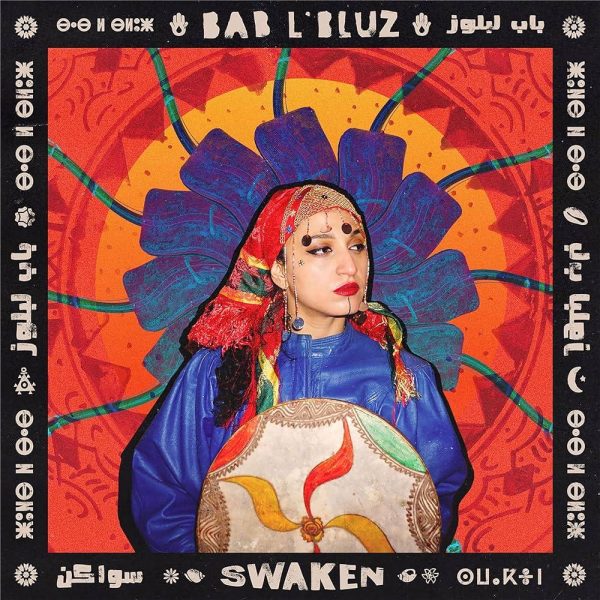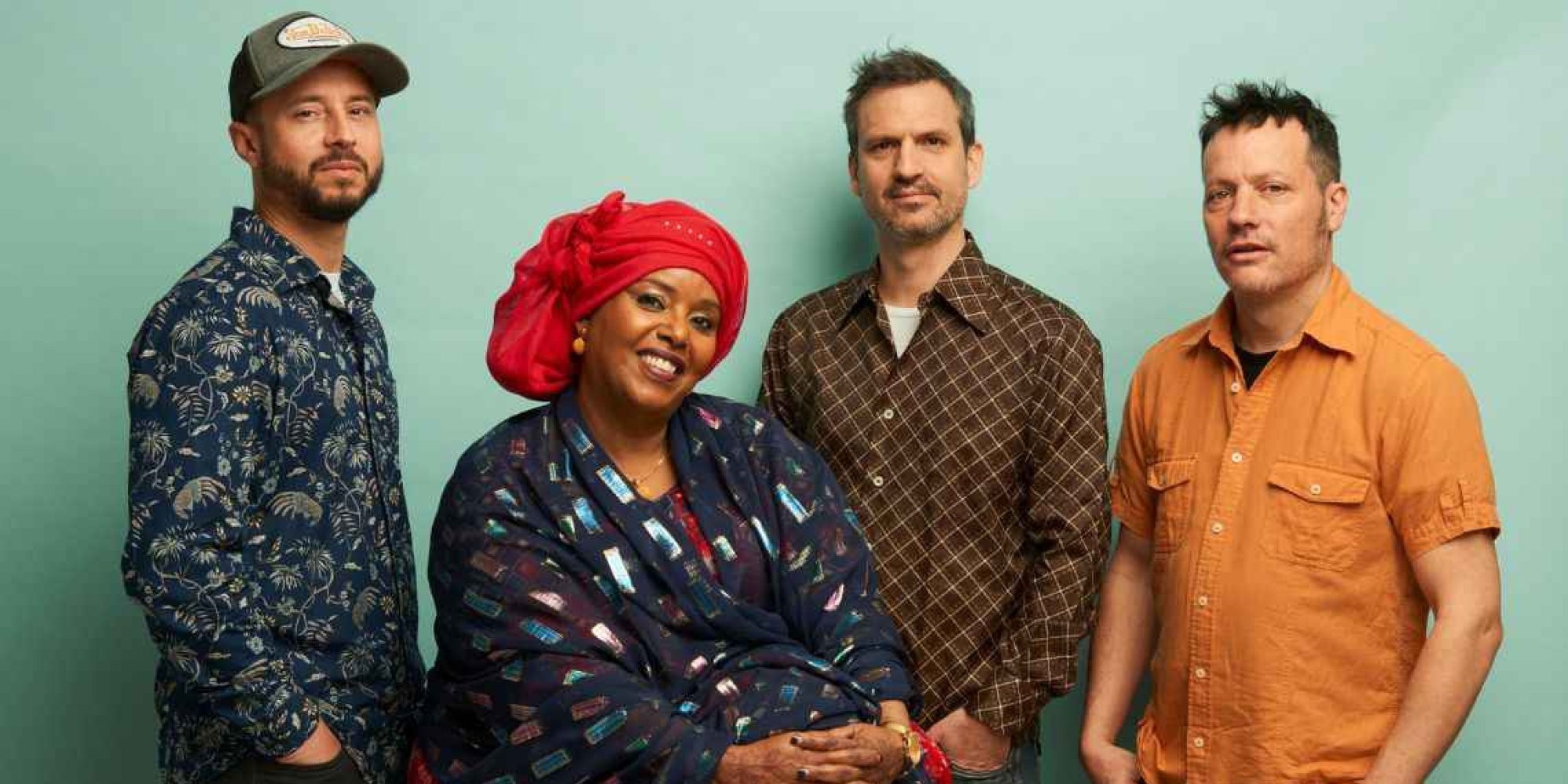Thumbnail image by Cris Ubermann
The history of Somalia (officially, the Federal Republic of Somalia) and Somaliland (officially, the Republic of Somaliland) in the 20th century is, sadly, and like too many African countries, a story of colonization, dictatorship, struggle for independence and civil war. During most of the century, French, Italian and British interests controlled and determined the fate of the Somalis until the beginning of the 1960's. The story is also very complicated and beyond our scope here. Suffice it to say that in 1960, a country called Somalia gained its independence. In 1977, a civil war broke out that lasted until 1991. When that war finally ended, there were these two countries. However, while Somalia is officially recognized as a country, Somaliland remains largely unrecognized, though it does have informal ties with other governments.
Sahra Halgan was born in 1972 in Hargeisa, Somaliland, though Halgan was not the name she was born with. Her grandfather was a singer, and as a child, she dreamed of becoming one as well. However, this was very much frowned upon by her family as singing was not an acceptable occupation for women. Nevertheless, she was determined. As she came of age during the civil war, Sahra joined the forces hoping to break away from the repressive dictatorship of Somalia. She volunteered as a nurse, caring for both wounded soldiers and civilians. The hospital didn't have any painkillers, so Sahra would sing all night to comfort the patients. She had recorded one song when she was 16, and the rebel forces pirate radio station put it on heavy rotation, finding it inspirational. “Halgan” was the name of the radio station, which translates as “fighter” in the Somali language, and so she became known as “Sahra Halgan.”
When the civil war ended in 1991, with the nation now split into two, Somaliland remained a dangerous place to be, as various clans who had fought together for independence now turned on one another. Sahra fled with her three children to Europe, hoping to connect with family members in the United Kingdom, but she was denied entry. However, she was successful in gaining political asylum in France and she eventually settled in Lyon, working as a cleaning woman, and supporting her own family, which grew to five children. It was there, through a PTSD support group, she was introduced to some local musicians and was finally able to realize her childhood dream to become a professional singer.
In 2012, she moved back to Hargeisa to realize a second dream – to open a cultural center in the city to support traditional arts. She named it Hiddo Dhawr, which means “Preserve the Culture.” In 2024, she released her fourth album, also named Hiddo Dhawr.
We thoroughly enjoyed Sahra's showcase at WOMEX in Manchester in October. Whenever and wherever Sahra performs, she is always holding a Somaliland flag in one hand. We were able to find time to sit for a long conversation with her and her French guitarist Maël Salètes, who served as our interpreter. What follows was edited for space and clarity.
Ron Deutsch: It was not an easy thing for you to want to be a singer. What kind of problems did it cause for you?
Sahra Halgan: My grandfather was a traditional song artist. And then, at that time, in my family it was not possible for the ladies to sing. My family, they wanted me to play basketball, not sing. For my family and tribe, it's not good for a woman to be a singer. They would say it's “bad work,” only for prostitutes. I told them I was going to be a singer.
I recorded just this one song before the war actually started. But when it did, I started the nurse thing because I wanted to help our people who were losing legs and arms.… the war wounded.
You were working at a hospital?
Yes. When we saw how the civil war was, we treated more and more people, not only soldiers, but civilians. When I started to volunteer, I asked the nurse who worked with doctors, “How can I help you?” They showed me how to make bandages and then I slowly learned how to do more. The hospital was at a medical school, but out of the city, because the city was gone. They bombarded it with artillery and airplanes; 90 percent of the city was destroyed. And so we saw all the people coming from the capital of Hargeisa, wounded. We would take clothes and cut them up to make bandages.
At first, I was a nurse on the front – it was very violent – and I was with the SMN, the Somalia National Movement. I would sing on this Radio Halgan, live. Later, I would travel with some musicians to different refugee camps in Ethiopia to sing. In these camps I would sing to the war wounded because at night we didn't have painkillers. And then, I don't know, some way, somehow they felt relieved, and they would sleep. I would sing all night. And then I would sleep in the morning when they woke up.
And it was at that time I came to understand that singing is not only for dancing. It's everything. The refugees came, and I sang to comfort them. Then there were all the soldiers going to fight, and my singing gave them the inspiration. Once those war wounded were more or less well enough to leave the refugees camps, I joined them on the front to take back Somaliland.
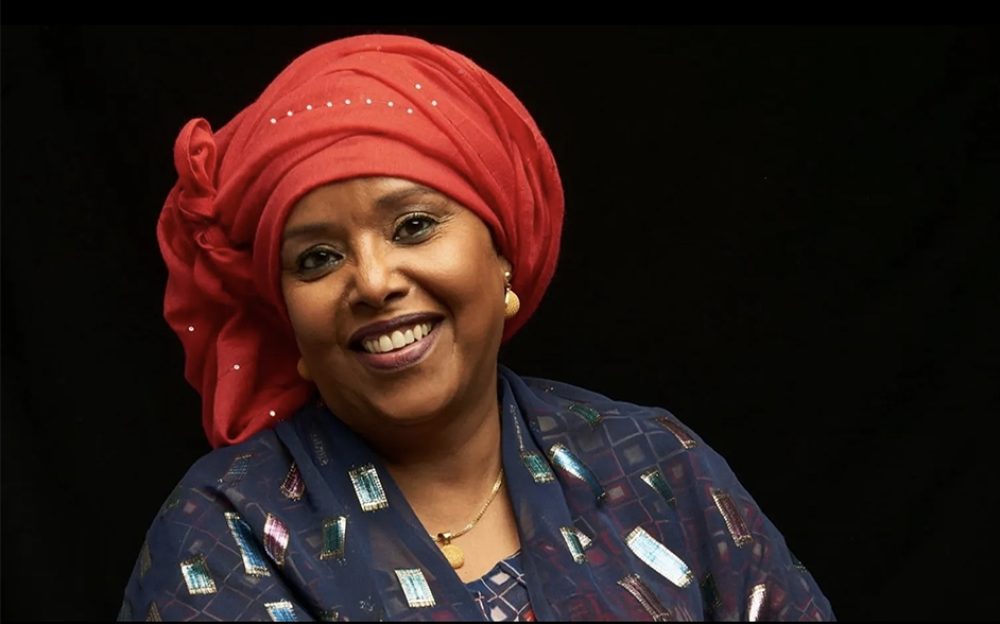
You eventually left in 1991, to go to France?
Yes. By then the war is finished. We were able to stop the dictatorship, but there was still a lot of trouble between clans because there was no government. And some people I helped to get better during the war turned on each because they were from different tribes. This was the reason I left to come to Europe. I never thought I would go live in another country, but I didn't feel safe. At that time I was in Djibouti, and my family said I shouldn't come back to Hargeisa. So I managed to get to Geneva, hoping to be with more of my family in the U.K., but they told me, “You don't have a visa, so you cannot go to U.K.... but you can ask for political asylum in France.” And after almost three months, they gave me a permit to stay. And it was crazy because in my country then, there were soldiers who were killing us – people with the same color, same religion, from the same land – but now here, this one white guy, a customs officer, was welcoming me. It was a big contrast.
I had hoped that when the civil war was finished everything would be okay. But it wasn't okay. I would see the people fighting each other and I wanted to cry. I felt guilty because I could see it was not possible to stay. And then later, I felt guilty because maybe if I had stayed, perhaps I would have helped people to make a reconciliation. You never know.
I didn't speak French. Nor English. Nothing! Only Somali language. But I had some friends I met in Djibouti who were in Lyon, so when they asked me where in France to send me, I said Lyon.
So in Lyon, you took on menial jobs to just make money and get by.
It was a hard life. I got a job cleaning and was raising my five children. A very hard life.
How did you find yourself coming back to singing?
There was this social center in Lyon where I was learning to speak French and they were teaching me embroidery. And I started to make this embroidery of children and their parents. But the ground, instead of green, was red, and in the image it was raining, but it was black rain that turns into fire. So the social worker asked me why did I do this. And I said, “This is what I see.” And she realized I was suffering from post-traumatic stress. So then they brought me to these workshops through the university in Lyon. And this eventually became a book of all the women's stories who were there. Through that, I was introduced to a classical dance company that wanted to do things with traditional songs from the immigrants, and then this introduced me to some musicians. There were a few bad experiences at the beginning, like recording with a musician who was more a dictator than a musician. [LAUGHS]
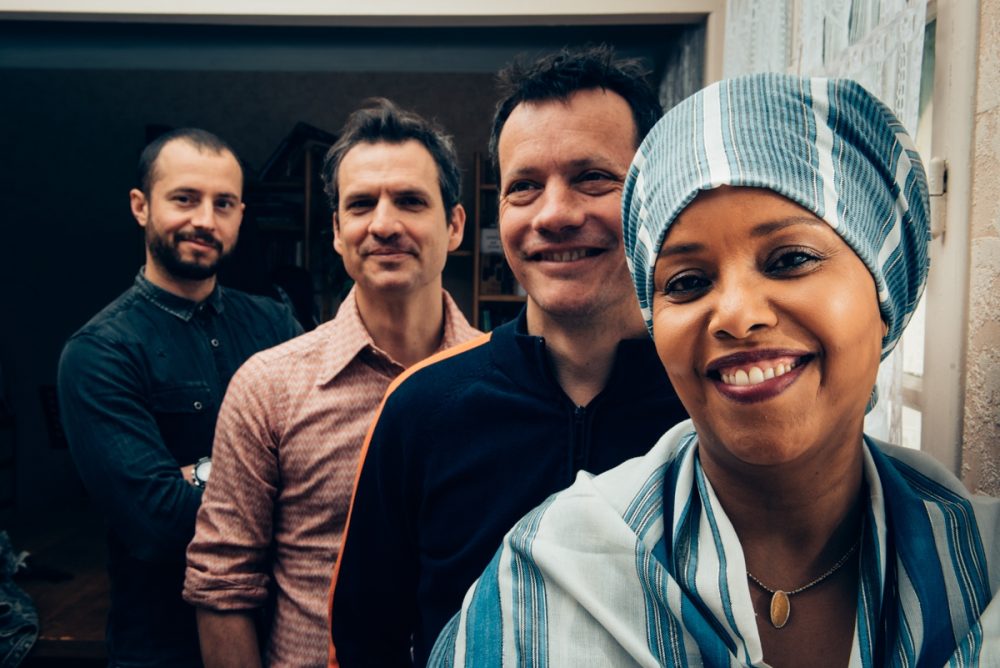
This was the 2009 album Somaliland?
Yes. But in this band, there was Aymeric, the percussionist.
Maël Salètes: And he saw Sahra and said, "Wow, what a woman! What a voice! What a story!" And he saw that it was not a good situation with this band.
Sahra: He saw that I wanted to stop and quit music. But Aymeric convinced me, saying, “Let's build something else. I have a friend, Maël.” And we started a trio, electric guitar, percussion and singing, and we did that from 2011 until 2019 when we took on a fourth musician.
It's all very collaborative in that way. There are different ways for us to build music. Sometimes the musicians write the music and then I find a melody to sing on it. Sometimes it's a melody that exists already. And the lyrics.... I have a lot of friends in Hargeisa who write poems for me. And also sometimes we do sort of covers of old songs. Some other songs are really, really old. There was this kind of music called Qurraami. It's sort of a Somali blues. It's a melody that everybody knows. Nobody remembers from where it comes from, but everybody can add their own lyrics. It's all about impossible love songs and tragedy and it's beautiful.
And Maël, what's your background in terms of how you come to play African music?
Maël: Both Aymeric, the drummer, and I, have strong connections with African music. Aymeric learned traditional drums in Mali from a master there. And since he was 18 years old, he spent a lot of time there. And for me, my parents used to live in Senegal. So since I was a very little kid I’ve had a really special feeling with African music, African people, African language. But my musical background is more indie rock/punk stuff. And when I met Sarah I listened and the way she sings, and to the sounds of oud players in Somaliland, they have something very rock ‘n roll in the way they play, very rough. So with my electric sound, it fits perfectly.
Sahra: Everybody comes with his identity, and then we mix it.
Maël: You know, for me, it's because in world music, there is a lot of what is called fusion and that has turned into something I don't care for anymore. It is this way of taking the traditional things and just putting beats and making something modern. Like you can put Somali language, but you could put the Chinese language, and it will be the same music. We really play traditional music in the way, I hope, that we respect all the codes of traditional Somali music. The beats, the way that the singing –all the traditional forms are quite respected. It's just a question of intention and sound that really gives the feeling of original rock music. So, you know, I hope that it's something different than this fusion thing.
Sahra: When you like what you do, there's no frontier. And I like the music. And it was also to tell the world Somaliland exists. This is still today for me. That's my most important message.
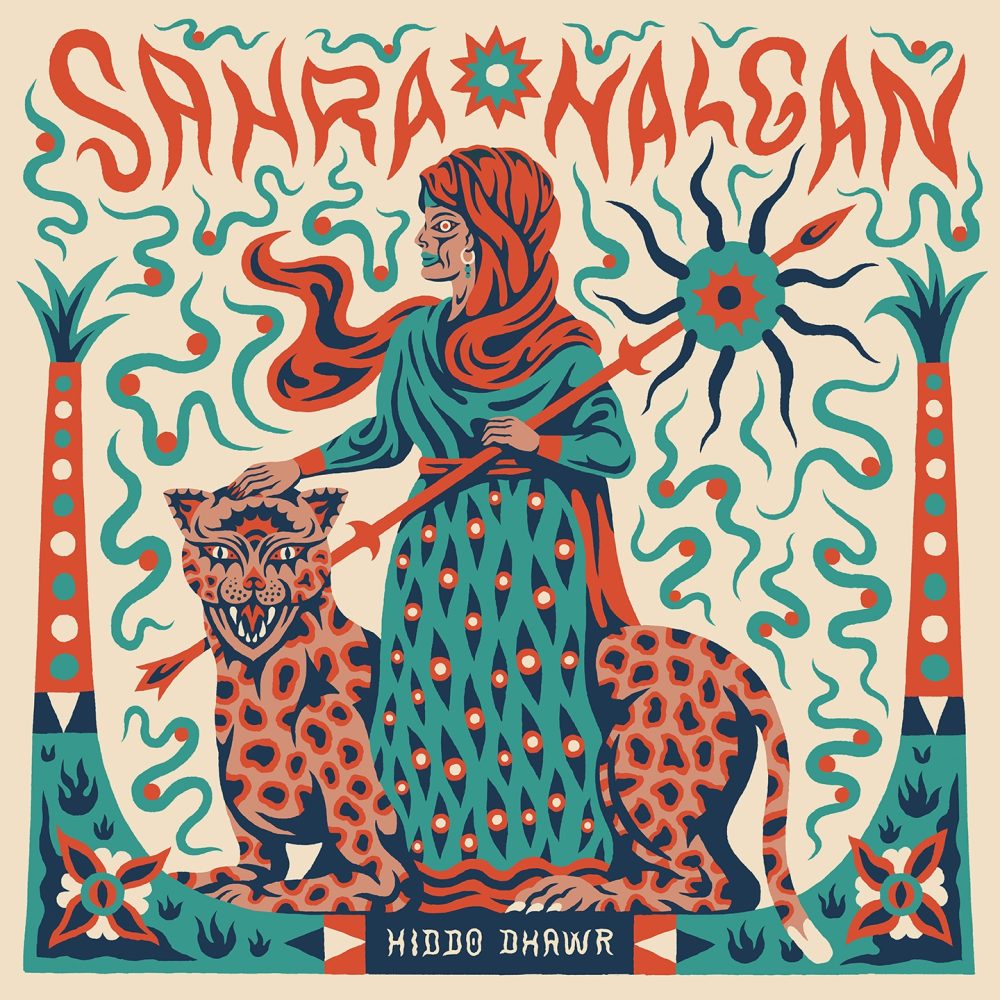
But then you decided to move back around 2012.
Somaliland has been a peaceful and independent country for 30 years. But Somalia, it's the opposite. It's a big mess. Yet Somalia is recognized by all international institutions, and Somaliland is not. Not in the U.N. and not in the African Union. But unofficially, many countries recognize that we exist and a lot of states do recognize that we are the only oasis of peace in the whole of Africa, but they can't recognize it officially because it's too messy for the geopolitics.
But doing music wasn't enough. The decision to move back in Somaliland, I really needed to do something in the country. So I created this cultural center.
Did you start this center with your own money or were you able to get funding?
I worked eight years as a cleaning lady in a high school. I had a good situation with this day job, but I resigned. They told me, you know, when you are working for the government, it's a safe job. I could have taken a pause and then come back to the job, but I said no. So they gave me some money and when I went back in Hargeisa, I presented my project to the World Bank.
I didn't think it was going to be a cultural center, but somewhere for artists, because artists there have nowhere to create. We were helping some people to start their own businesses. But then I said I have to find somewhere where we can sing and have live music. It didn't exist anywhere. And then they gave me some money, and with my money, as well, I have been building this place called Hiddo Dhawr. Keep the culture. Preserve the culture.
And you've been doing this for 10 years now.
Yes, but it was very hard at the beginning because this Islamist sheikh, an Imam, said: “You are bringing us this European style. Bringing women and men to sing together. What is that?” And I said that during the civil war when I sang and was a nurse nobody complained. And I said: “Where do you come from? You are the same age as me. You are not a little boy.” And for three years they would come sometime just to harass me and tell me to stop. No violence, but then I went to this man's mother and told her to tell her son to leave me alone. And now, I just pay them off whenever they come to help build their mosque.
We call that extortion.
But I tell you if it was a man who ran the center and not me, a woman, they wouldn't bother. But I was a fighter and they can't stop me. The music is the love, the peace, the family. The music is everything, especially for me. It's the force of peace. I think the poetry and the songs are a tool very important to solve conflict. It's in the Somali culture. To resolve conflicts, you have to find the poetic way.
Thank you very much for your time.
Thank you.
Related Audio Programs
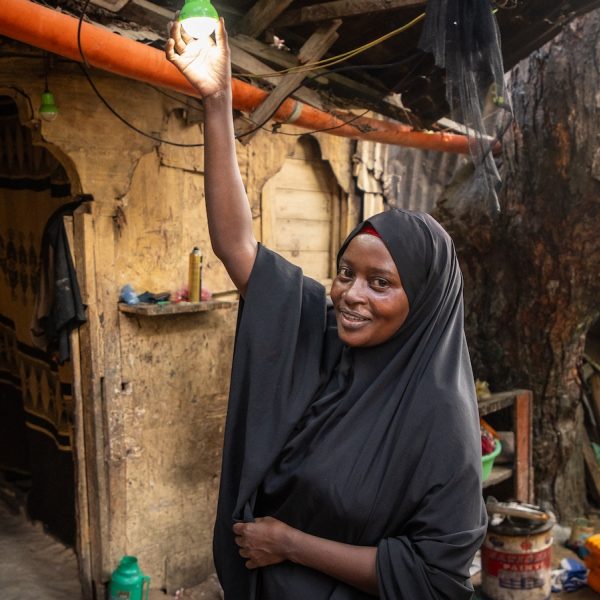
Related Articles
